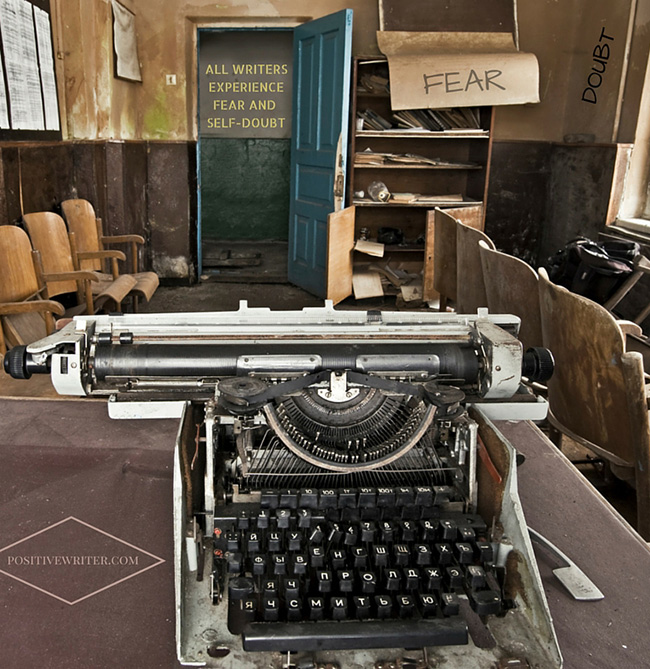Writers mistakenly believe there are endless reasons why you do not produce:
You think you’re too lazy to write.
You worry your stories are not good enough.
You want to write, but can’t seem to make yourself sit down and do it.
These are all excuses, as well as variations of the same struggle. The enemy of writers everywhere is…

F e a r
Fear of failure. Fear of success. One thousand different phobias that keep you from making your dreams come true.
Fear is sneaky, though. It doesn’t jump out and scream, “Boo!” Fear disguises itself in multiple ways and affects everyone uniquely. It hits each of you where you’re most vulnerable.
I’ve heard from hundreds of writers and now see clear patterns in the different fears, as well as understand how to conquer them.
Here are the top three ways fear sabotages your writing:
1. Self-Doubt
Hands down, this is the #1 fear and dreaded enemy of all writers.
You worry you don’t have enough talent to be successful.
If you do schlep words onto the page, you’re sure nobody will ever want to read them.
You debate if writing is worth the investment of time because you’re so rotten at it.
Every bit of this is fear, and all writers experience self-doubt throughout their careers. (Click to Tweet)
I’ve watched this firsthand over the years. I have talented friends whose hard work and determination have landed them on the New York Times Best Seller’s list. However, they agonize over each new novel, sure their editors will hate it, certain their readers will discover their previous successes were mere flukes, and that they’ll die unloved, penniless and alone.
So, whether you are Nancy Newbie or Bobby Best Seller, you’re going to face self-doubt.
The fact is not everyone is going to like your writing. This is true for every writer, published and unpublished.
Don’t believe me? Look up your favorite book right now on Amazon and someone will have given it a poor review. I just did this with Stephen King, J.K. Rowling and Michael Cunningham. All three have hit the NYT multiple times, yet they also have multiple one-star reviews.
With time, patience and practice, you can grow in your craft and find the right audience for you. Believe in yourself and write on.
Solution:
Every writer experiences self-doubt. If you want to be published, then share your work in ways to grow in your craft: through qualified critiquers, entering respected contests, submitting to agents and editors. Keep writing!
(Bryan wrote a fantastic book about this, you should read it.)
2. Perfectionism
Although this is the #2 struggle for all writers, it can be more destructive because it’s like self-doubt on steroids.
You can’t even write one full page, because you keep judging, criticizing and editing as you go.
You start your story over and over, searching for the ideal beginning, but rarely finding it. Or, you do happen to finish the entire manuscript, then deem it unworthy and throw it out to start again.
You worry so much about others criticizing your work that you never share anything with others.
Let me be clear. You should always strive for excellence in all aspects of your writing and publishing. Your work should be error-free, and as flawless as possible.
Perfectionism is different.
Why?
It’s abusive. The difference between the two is striving for excellence feels wonderful because you’re trying your very best. Perfectionism feels terrible because your work is somehow never quite good enough.
Do your best, then let go of the rest.
Solution:
When you’re writing, let yourself get the words onto the page first, without judging, criticizing or editing. Polish and proofreading come later. Find competent, trusted readers to help you decide if your work is ‘good enough’ and ready to be shared with others.
3. Procrastination
Struggle #3 is most interesting because most every writer is guilty of it.
You don’t say, “I’m not going to write.”
You say, “I will write.”
Tomorrow.
Or, after you throw another load of laundry in the wash.
Or, after you’ve researched your subject matter some more.
How many times have you had just 30 minutes to write, but you wasted those precious moments on other things? Everyone has their favorite time wasters: checking email, social media, suddenly cleaning the house, reading writing blogs or books, reading novels in your genre to study the market.
If procrastination is your struggle, then you need to be honest about what you do to avoid the page. My go-to time-wasters are: checking email, scrolling through Facebook, and reading articles on MSN.com. Every one of those activities can wait until later.
Solution:
Analyze your favorite time-wasters and be honest why you use these activities (either self-doubt, perfectionism or both), then get to work.
Fear’s Other Disguises
Here are a few other ways fear masks itself to sneak up and stop you: self-sabotage (binge-watching TV), sabotage from others (guilt from friends or family members over your time wasted on your little hobby), and jealousy of others’ success (he won that contest, or she’s an Amazon Best Seller).
Fear is part of the creative process, and in life for that matter. Fear wants to stop you from making any sort of positive changes. It’s why you dread tomorrow’s writing session, why you never used that expensive gym membership you bought, and why you pay off your credit cards, then rack up debt all over again.
Fear is Good
What?
Fear is actually a positive sign. It’s a gauge that shows how passionate you are about your writing. The more fearful you are, the more important it is you and the more you must get those words onto the page.
From now on, expect fear in your creative process, then write anyway.
Good luck!
How are you dealing with your fears? I’d love to hear from you in the comments.
This post is by Positive Writer contributor Marcy McKay.
